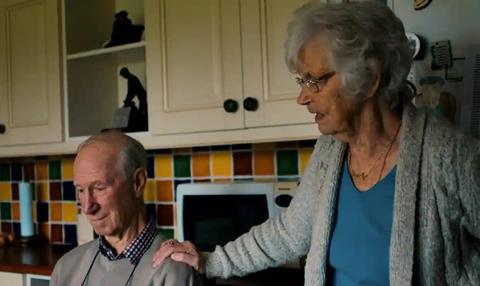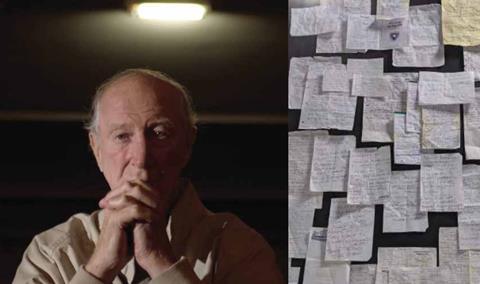Discovering rare team footage and hand-written notes changed the course of a documentary on the life of England World Cup winner and Ireland manager Jack Charlton

When Noah Media set out to create a feature-length documentary about Jack Charlton – the English World Cup-winning legend who became an Irish hero – it had no idea what a treasure trove of undiscovered content it would uncover, and how its existence would dramatically alter the editorial focus of the film.
A chance conversation towards the end of filming led to the production team stumbling across a stash of Jack’s hand-written notes, which quickly became invaluable to the narrative of the documentary.
At the same time, tireless research and separate trips to Melbourne and Boston resulted in the team uncovering unseen archive footage that also became crucial to the film.
Meanwhile, interviews with Jack’s wife Pat and son John offered incredible and often heart-wrenching insight into Jack’s day-to-day life living with dementia.
All of this elevates Finding Jack Charlton – which will be broadcast on BBC2 next year – way beyond the average sports doc.
During a break in editing, Broadcast Sport joined director Gabriel Clarke (Bobby Robson: More Than A Manager; Steve McQueen: The Man & Le Mans) and Pete Thomas (Take His Legs) to discuss the thinking behind the doc and how they were able to gain access to Jack Charlton and his family.
Clarke explains: “We did Bobby Robson: More Than A Manager and we didn’t necessarily want to do another film about a great English manager. But there was this idea of covering Ireland’s story, and I got talking to Andy Townsend, who played in Ireland’s World Cup 1990 team, about whether anything had been done on the impact of that team and Jack on the country.”
Townsend said he didn’t think there had been anything beyond a few TV documentaries that just told the football story.
He was still in touch with Jack’s family, so Townsend called John to arrange a meeting for Clarke to talk through his idea face to face. Jack came along and, says Clarke: “It was at that point we realised Jack wouldn’t be able to contribute in interview terms to the film,” such was the state of his dementia.
Clarke asked the Charlton family if they knew of any unseen archive material, and it seemed hopeful they would be able to find leads to some.
Clarke says: “We were able to tick some of the boxes in terms of original material, original filming ideas, unseen archive and Jack’s own developing story from a dementia point of view.”
The film was greenlit, funding was sourced and, soon after, Clarke and Thomas got a series of enlightening interviews with Pat and John in the can.
“We didn’t do long interviews with either of them, but Pat’s a strong lady and is very proud of Jack’s story,” says Clarke. “She hasn’t been interviewed very much before, so it was great we were able to develop that relationship. Jack’s condition deteriorated during the process and we had a sense, even pre-Covid, that by the end of our production, Jack may not be alive, so we were obviously having to weigh up that sensitivity as well.”
The footage the crew shot at Charlton’s house demonstrates the unrestricted access they were given to the family. Thomas says repeated visits built up the trust necessary to enable such access. “We spent a good deal of time with the family.
I went to visit a few times without cameras, to update them on the process and talk through things and try some things with Jack. One thing we found is that Jack always came alive on camera.”
A number of unseen archive clips – including footage filmed around a fountain at the Irish team’s hotel after they were knocked out of the World Cup in 1990, and video shot on the team’s bus – became fundamental to the film’s story.
In the middle of the footage at the hotel, Charlton leads a sing-along of Blaydon Races. Poignantly, at the end of Finding Jack Charlton, he is singing the same song – just weeks before his death.
The archive clips took considerable effort to find. Thomas says: “We had heard that the fountain and bus incidents had been filmed and were desperately trying to find the footage. We tracked some of it down to Sydney and some of it to Boston.”
Additional archive material uncovered includes extremely rare footage of Charlton doing some after-dinner speaking.
“This was the holy grail we’d been after for a long time,” explains Thomas. “We’d always known Jack was this brilliant speaker but his after-dinner speeches weren’t really filmed. But, bizarrely, someone we’d been filming with spotted a Facebook video a contact had put up of Jack doing an after-dinner speech and sent it to me. From this, I managed to track down the person who had posted it originally – it had been filmed in a football club in the north of Ireland in the late 1980s. He said he’d love to have it featured.”
Clarke adds: “For people in Ireland to see evidence of elements of the story that they’ve not seen before will be really good. It will be proof of the myth, in a way. And the fountain scene was crucial. It was evidence of the team spirit and what they created. That is the highest moment – Italy 1990 – in many ways. It was a transformative moment for the country, so having that ‘inside the camp’ footage was brilliant.”

A board featuring a collection of hand-written notes appears regularly throughout Finding Jack Charlton, with notes introducing different strands of the narrative.
It’s difficult to imagine the film working so well without the notes – but their existence was only discovered near the end of filming.
Thomas explains: “During one of my trips to see the family, I casually said to Pat: “There isn’t anything we haven’t seen that you might have?”
To his surprise, Pat went away, rummaged in Jack’s office and came back with a brown envelope stuffed full of bits of paper, saying she thought they might be his old after-dinner ‘jottings’. She also produced a folder full of tactical notes.
Valuable Insights
Thomas says: “It seems every time he went to a new after-dinner event, he wouldn’t take notes with him, but would pick up the menu or whatever piece of paper was knocking around, and he would write out headings for what he was going to say that night. They became almost little headings into his life, and also some amazing philosophies on life.”
Clarke adds: “There were the principles of management as he saw them. Some of those basic things Charlton was working with were ahead of their time in many ways. It was great to get a window into his man-management capabilities, as I think sometimes they got a bit lost behind the image of this stubborn old fella who does it his way.”
The film also covers the strained relationship between Jack and his brother Bobby, although Bobby’s family isn’t directly involved in the making of the film. Clarke says: “We did hope Bobby would get involved. We asked several times and eventually Lady Norma Charlton responded, and very politely declined. The film gets across that authentic sense that the families were estranged, as sad as that is.”
Jack died during the making of the film, and the documentary ends with him listening to Blaydon Races, singing along to the lines he can remember.
Clarke says: “We got news that he was deteriorating and decided to go up and do a final shoot. It was very, very sad, but also it wasn’t unexpected at that point that he was going to die. The intimacy of the scene with Jack singing Blaydon Races is a celebration. It ends positively rather than with shots of his funeral.”
The TV premier of Finding Jack Charlton takes place on the BBC in the UK and Virgin in Ireland (on 28 and 29 March)







No comments yet